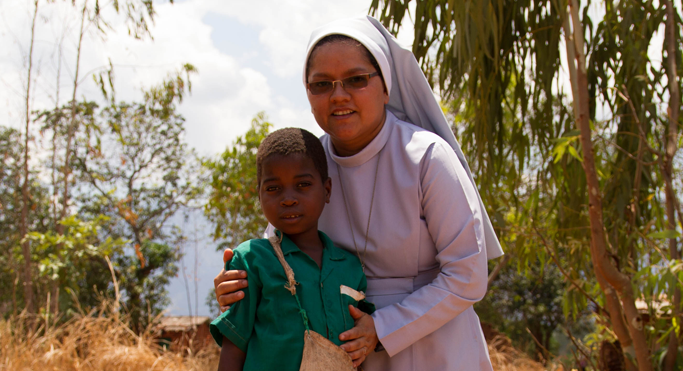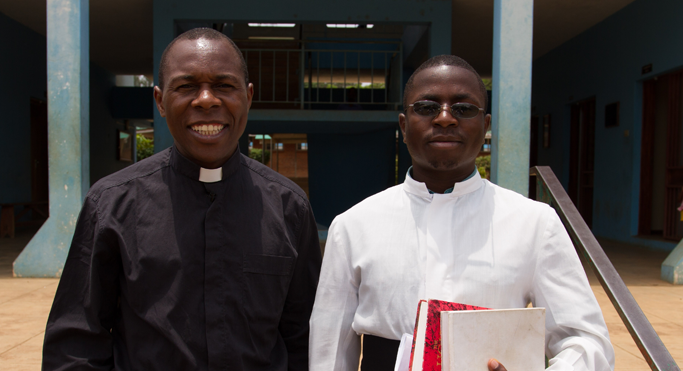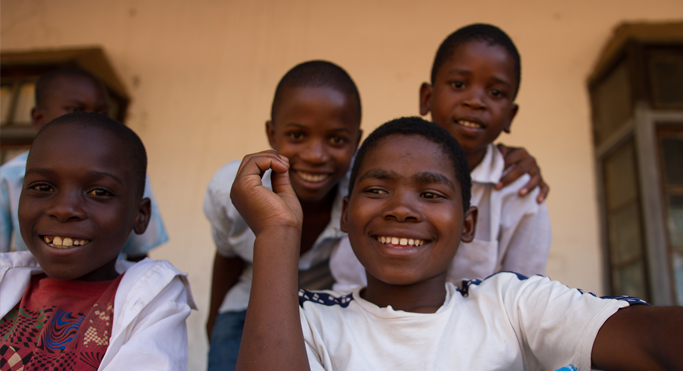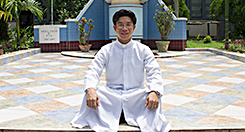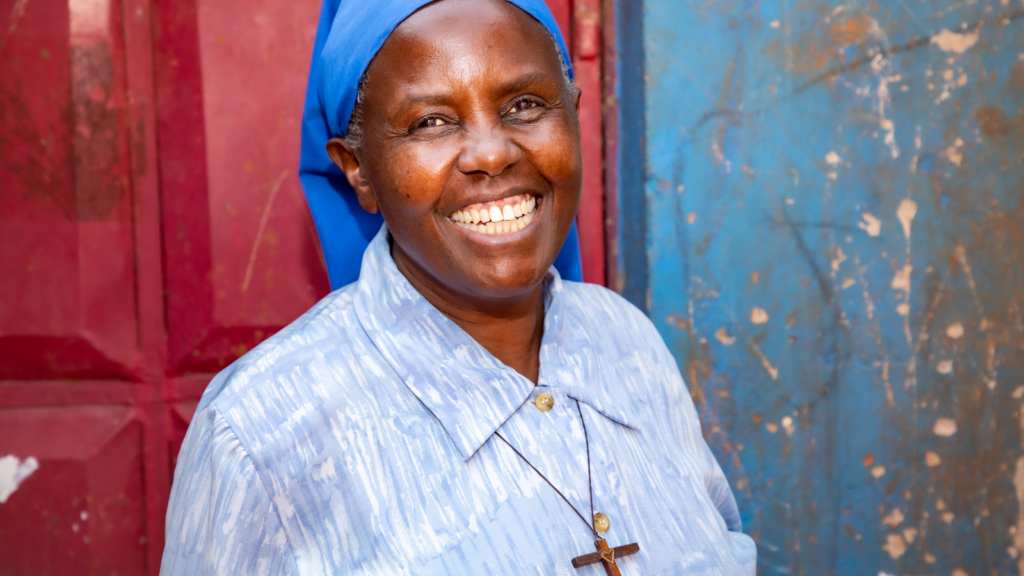This year’s World Mission Sunday campaign takes us to Kibera in Kenya, which is the largest ‘slum’ in Africa. It’s rife with all the problems poverty brings – malnourishment; addiction; abuse. But missionary Sister Mary meets the challenges of life in Kibera with faith and friendship. Here, she shares about her charism, her mission, and the community she walks alongside:
Part of our charism as Little Sisters is befriending, as Mary the mother of Jesus did when she went to Elizabeth. Since coming here in 2012 I have been accompanying the novice sisters, but when they go to school, I have time to go visiting.
I began with the Christians I met in church. From there, little by little, I gained their confidence, and they would welcome me to their houses. In the process, they shared some of their problems.
Even if I have nothing to give them, at least when the stories are painful, it is possible to find someone who can help. It leads me to create friendships with other people who are able to help.
What befriending means to me
I do a lot of listening. People in need come to our house, or sometimes I meet them at our local church, and we sit down and talk. When I’m not able to help them, or if they have suffered physical damage, I contact doctors who are friends and are able to help. Or some other Sisters, who work with the hospitals, so they don’t have to pay too much to get treatment.
So it’s friendship, but friendship that means you can’t just sit and watch, that something has to be done.
‘Hearts on fire’ means ‘feet on the move’
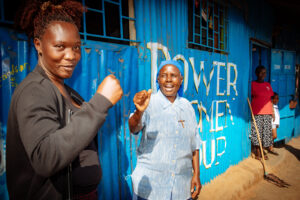
Sometimes I meet young girls who are still in school or even university. Their parents are drinking, and the girls come into Kibera and stay with people who are dealing drugs. So that means that when we talk to them, it can be dangerous. So I work alongside people from Church or people who know the area well.
Some girls we are able to talk to and we can help rehabilitate them so they can return to college or back to school. With some others it is not possible.
And you know, you also find very bright children, but their parents are not able to pay the government school fees. So that is a heartache sometimes. I do anything I can so that they can go to school, that they can study and do something. I network with other people. Sometimes I tell our Superior and they are ready to help too. And it’s a big thing; if nobody helped them to continue at school, then they would be vulnerable. People would misuse them.
Fighting child trafficking
Sometimes you meet somebody who is very friendly and who you think is doing good but they’re actually doing something else. All because of money. It’s painful; before, I would never even think a woman, a mother, who has children, can take children from another person and exploit them for money.
And, you know, it’s happening in the same street: Their mothers are passing by, but they don’t know what’s going on. Because children don’t always speak up. They have really to trust you to speak up. It takes a lot of time and a lot of patience to befriend them until they know they can trust you and can say something.
The vital network of friends
I always know who can do what, and that is what helps me keep going. Otherwise, it can be sometimes very stressful, coming here and feeling there is nothing one can do. The network for me is what is important. Because we can’t do it alone.
One with the people
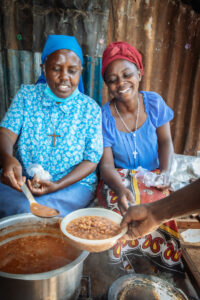
Our charism is ‘be one with the people’, ‘go where people are’. It’s from Saint Paul. But our foundress, Sister Magdalene also took it from Charles de Foucauld, who said that you don’t come to them, like somebody who is able to come and go, but you be there with them, from the grassroots, discover what is happening, and learn together what to do.
So, that’s why it helps here to work with the different women, like Linet. And I have other friends who are professionals. They live in different areas, but if I tell them there is a woman in need, they always send something to me.
I feel it’s important to be a bridge. Me, I live here with them. I don’t have the material things to offer, but I can listen, I can pray for them. Because our work is also prayer.
We can connect them with those who don’t live here. Once a lady was coming to visit, and she was afraid to come here. But she came, she saw where we are living, what we are doing. When people are touched, they help one another when they are able.
So, I find it important to be able to connect and to help people know what is happening here in Kenya where we are.
Watch our World Mission Sunday film from Kibera:
Working with Fr Firmin
I work with Father Firmin. We work a lot in counselling, but if I have young men who I’m not able to help or if they are deep into alcoholism or drugs, he takes care of them.
I can always rely on Father Firmin and others. I say, ‘this person, this young man is suffering, but I’m not able to help’. And when men talk to men, it’s much easier. Similarly, when there is a girl who needs help then they send them to our house.
Life in Kibera
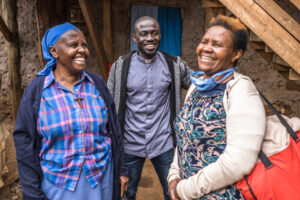
Kibera for me is not just poverty and despair. There is violence, alright. There is poverty, right. But maybe here more than elsewhere. You also find the people who live deep values. That one knows their neighbour is in trouble. And they open their doors for one another.
In our church here, you discover these groups, be it the choir, be it the Rosary group or the people we meet for Adoration or things like that. Then they say, ‘we need to be contributing something for those who cannot; those who don’t have’. They might not give much but that little can help a child see the doctor. This one helps that one to return to school. They have human values of respecting one another and supporting each other. You find it here more than elsewhere.
My happiest moment
When a child turns into a drug addict, or to alcoholism or prostitution, it is the most heart-breaking thing. Because you see this person had potential. But now because this and that happened, they have taken shortcuts or they have fallen into depression or something. So those are difficult moments.
But there are also great moments, when children pass their exams, and you hear they are going for graduation. This one is becoming a doctor, or that one has become a social worker.
My happiest moment is when I hear a child is doing very well and has moved on. Or you find, somebody was living here and the child has found a job and they go somewhere else. You know, it gives hope. Children bring hope and life.
Even when parents struggle, they know, ‘my child will not be where I am. Me, maybe, I didn’t go to school, but my child has gone to school’. It’s very good. Because each one is one person out of these conditions.
Get involved
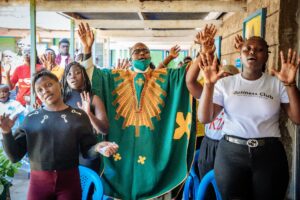
One by one, however and wherever we can, we are helping to lift people out of poverty and despair and befriending those who are frightened and alone. This World Mission Sunday and during Mission Month, please join us to pray and give whatever you can to support missionaries in Kibera and around the world.
With your help, we truly can set hearts ablaze with God’s love!
- Donate to World Mission Sunday here>>
- Celebrate World Mission Sunday in your parish – find our downloadable resources here>>>
- Pray with us throughout Mission Month – get your daily reflections here>>
- Could your parish community fundraise for Missio this month? Get your FREE fundraising pack here>>

